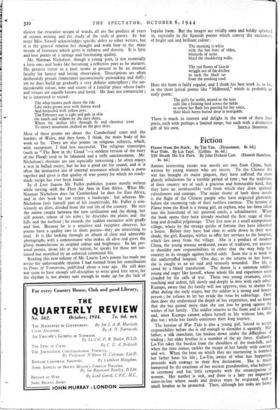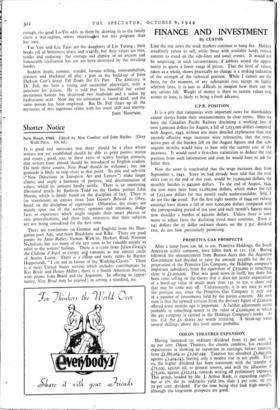Fiction
Flame from the Rock. By Tan Yiin. (Heinemann. 8s. 6d.) AMONG interesting recent war novels are two from China, both written by young women who are sisters. To the Chinese the war has brought its major plagues, they have suffered the most ghastly tribulations for a terrible period of time ; but the traditions of their country are of such a gracious and honourable kind, that they have an inexhaustible well from which they draw spiritual refreshment and courage. The major theme of both these novels is the flight of the Chinese people who have migrated gloriously before the oncoming tide of their ruthless enemies. The heroine of Flame from the Rock is a young girl, an orphan, who has been taken into the household of her paternal uncle, a schoolmaster. When the book opens they have already reached the first stage of their long and dreadful pilgrimage. They live now in a small unimportant village, where by the strange quirks of fortune they have inherited
a house. Before they have had time to settle down in their new abode, the girl, Kuanpo, wishes to offer her services to the hospital, which lies away from the village. She is a product of modern China, the young woman awakened, aware of tradition, yet anxious to shoulder new responsibilities in order that she may help her country in its struggle against fearful odds. Soon she is at work in the understaffed hospital. One day, as she returns to her home, she is caught in an air raid and seriously wounded. Her life is saved by a blood transfusion. The donor is a common soldier. young and eager like herself, whose whole life and experience seem clouded by the calls of war. These two young creatures, vivid, touching and ardent, fall slowly and deeply in love with each other. Kuanpo, aware that the family will not approve, tries to shatter the affair during the early stages, but the soldier is a strong and honest person • he refuses to let her evade the issue by subterfuge. Only then does she understand the depth of her experience, and so know that she has gained more than she can lose by going against the wishes of her family. The soldier returns to the front and is killed, and, since Kuanpo cannot adjust herself to life without him, she dies too ; while her family continues their long journey.
The heroine of War Tide is also a young girl, forced to accept responsibility before she is old enough to shoulder it squarely. Her father, a silk merchant, has broken down under the difficulties of trading ; her elder brother is a member of the air force. Gallantly Lo-Yin takes the burden from the shoulders of the men-folk, and when the time comes' tackles the escape of her family with courage and wit. When the boat on which they are journeying is bombed her father loses his life ; Lo-Yin aware of what has happened, proceeds with °mirage to their Lo-Yin, destination. She is much hampered by the exactions of her ancient grandmother, who believes in ceremony and has little sympathy with the emancipation of women. Her mother is sick, and there is a lazy yet important sister-in-law whose needs and desires must be respected, and a small brother to be protected. Then, although her tasks are heavy
enough, the good Lo-Yin adds to them by drawing in to the family circle a war-orphan, whose miseriempire not less poignant than her own.
Tan Ytin and Lin Taiyi are the daughters of Lin Yutang ; their books tell of bitterness, chaos and tragedy, but their values are true, tender and enduring: the courage and dignity of an ancient and honourable civilisation has not yet been destroyed by the invading hordes.
Sudden death, rumour, scandal, fortune telling, somnambulism, jealousy and blackmail all play a part in the build-up of John Dickson Carr's novel Till Death Do Us Part. The detective is Dr. Fell, the hero a young and successful playwright, with a penchant for poison. He is told that his beautiful but rather mysterious fiancée has destroyed two husbands and a suitor by hydrocianic acid. Next day his informant is found dead, and the same poison has been employed. But Dr. Fell clears up all the mysteries of this ingenious crime with his usual skill and alacrity.
JOHN HAMPSON.



























 Previous page
Previous page